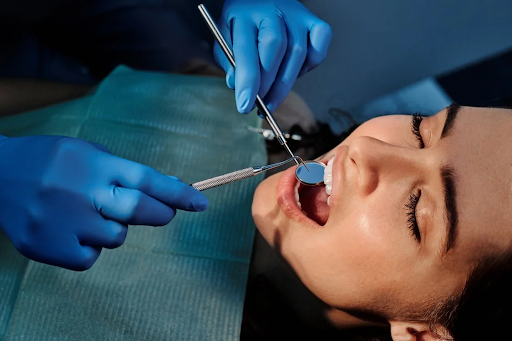After waking up feeling unrested night after night, you may uncover there is a deeper issue at play such as a sleep disorder. If you’re suffering from obstructive sleep apnea, you may wonder how this impacts your overall health. While it’s common knowledge that obstructive sleep apnea increases the risk of health problems such as heart disease, stroke, hypertension, obesity, and more, it can also have damaging effects on your oral health. Sleep apnea can cause oral health issues, but dental problems can also lead to sleep apnea.
If diagnosed with sleep apnea, you should also enlist the help of a dentist that specializes in sleep apnea patients. A dentist with proper training and knowledge about sleep apnea can help diagnose problems with your mouth or jaw that may be causing or worsening your sleep apnea symptoms.
To help you get the treatment you need for your sleep apnea and dental health problems, ApneaMed has put together a guide that explains the connection between obstructive sleep apnea and oral health.
The Connection Between Sleep Apnea and Dental Problems
There’s nothing more frustrating than feeling completely lethargic after getting a full night’s rest. It’s no surprise that individuals often feel irritable or moody, but untreated sleep apnea can wreak havoc on one’s dental hygiene. Here are a few oral health problems that may occur due to sleep apnea or can increase the risks of sleep apnea.
Overbite
Having an overbite can lead to more problems than snoring. If you suffer from an overbite, your partner may complain you are constantly snoring throughout the night. Due to the jaw's positioning too far back, the patient is more susceptible to sleep apnea because the soft tissues have a greater chance of collapsing and blocking the airway.
Readjusting the positioning of an overbite while sleeping can reduce airway blockage.
Dry Mouth
Because sleep apnea causes a person to experience a blockage in their airway, they often find themselves choking or gasping for air in an attempt to reopen their airway. To effectively do this, the individual usually opens their mouth to increase the air entering their system, which increases the chance of dry mouth.
While dry mouth may not seem detrimental to oral health, it can significantly impact saliva production and bacterial growth. Those with sleep apnea are more likely to experience tooth decay, bad breath, and gum disease if their sleep disorder goes untreated.
Bruxism
Have you been told that you grind your teeth while sleeping? It’s common among those with sleep apnea due to the individual attempting to reopen their airway after the collapse of the soft tissues.
Minor teeth grinding may not cause significant damage to one’s oral health, but if proper tools aren’t used to prevent bruxism, there could be permanent damage done.
Periodontitis
The chance of gum infections also referred to as periodontitis, is believed to increase when a patient suffers from sleep apnea. Although the risk of gum infections can be reduced through proper oral hygiene, such as brushing and flossing regularly, sleep apnea may cause a spike in inflammation levels which can aggravate their gums — resulting in excess plaque and bacteria in their mouth.
Testing and Treatment for Obstructive Sleep Apnea
If you have any signs or symptoms of obstructive sleep apnea, you shouldn’t put off taking a sleep apnea test. Untreated sleep apnea can increase your risk of these health problems, including oral health issues. With ApneaMed’s home sleep test, a board-certified sleep physician will analyze your results to determine the correct form of treatment.
If you’re interested in a self-administered sleep apnea test from ApneaMed, contact our team to learn more.

